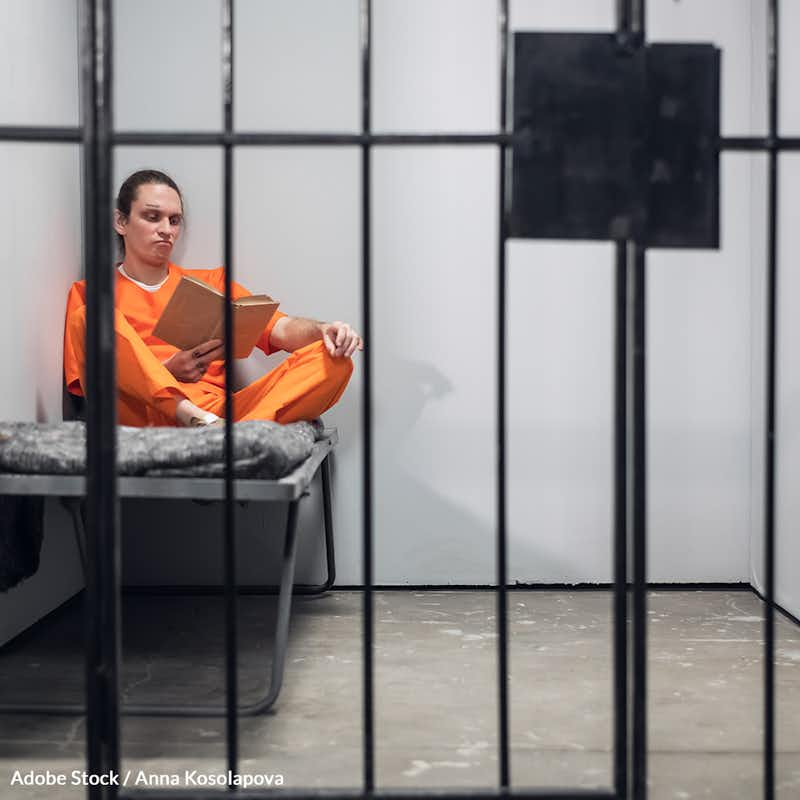Bring Down Barriers to Literacy in Prisons
5,677 signatures toward our 50,000 Goal
Sponsor: The Literacy Site
Help remove the stigmas and barriers to access that are keeping countless incarcerated Americans illiterate.

Illiteracy is an often overlooked aspect of mass incarceration and the criminal justice system in the United States1. The Literacy Project Foundation found that three out of five people in U.S. prisons can't read and 85% of juvenile offenders have trouble reading. Other research has estimated that illiteracy rates in prisons are as high as 75% of the prison population2.
This unaddressed issue in the United States prison system is inextricably linked to high recidivism rates.
There is in fact a strong connection between early low literacy skills and our country's exploding incarceration rates. Compelling statistics underscore this connection:
- 85% of all juveniles who interface with the juvenile court system are?functionally low literate3.
- High school dropouts are 3.5 times more likely than high school graduates to be arrested in their lifetime4.
- High school dropouts are 63% more likely to be incarcerated?than their peers with four-year college degrees.
In 2003, the U.S. Department of Education conducted the National Assessment of Adult Literacy (NAAL) survey, assessing the English literacy of incarcerated adults6. Out of 1,200 people incarcerated in state and federal prisons, as well as 18,000 non-imprisoned Americans, the NAAL found that people in prison are 13% to 24% more represented in the lowest levels of literacy than people in the free world7.
In spite of their overall lower proficiencies, many inmates get no help with activities like filling out forms, reading newspapers or other written information, reading information from agencies and companies, and writing letters8.
Research has shown that arming inmates with a solid education is one of the surest ways of reducing the rate at which they end up back behind bars after being released9. Education as an important form of rehabilitation, but the reality for prisoners is far different. Stigmas and barriers to access are keeping countless incarcerated Americans illiterate. Only a slim percent of inmates are in academic classes, and fewer attend vocational classes.
The issue of illiteracy is rampant in prisons across the country, especially in Mississippi, which holds the second highest rate of incarceration in the nation. This issue will only grow if it is not addressed. Sign the petition below and demand that incarcerated Americans have access to libraries and help with reading and writing.
- Michael Sainato, Observer (18 July 2017), "US Prison System Plagued by High Illiteracy Rates."
- Invisible Children, KARA Group (2020), "75% Of Inmates Are Illiterate (19% are completely illiterate)."
- Begin to Read (2021), "Literacy Statistics."
- Alliance for Excellent Education (15 September 2010), "High School Dropouts in America (Updated)."
- Literacy Mid-South (16 March 2016), "The Relationship Between Incarceration and Low Literacy."
- Corey Michon, Prison Policy Initiative (1 April, 2016), "Uncovering Mass Incarceration's Literacy Disparity."
- National Center for Educational Statistics (2003), "Literacy Behind Bars: Results From the 2003 National Assessment of Adult Literacy Prison Survey."
- National Center for Education Statistics, U.S. Department of Education, Office of Educational Research and Improvement (October 1994), "Literacy Behind Prison Walls."
The Petition:
To the Mississippi Attorney General,
Your state currently holds the second highest rate of incarceration in the nation, and many of those imprisoned are being pushed toward recidivism by barriers to literacy.
There is in fact a strong connection between early low literacy skills and our country's exploding incarceration rates. Further, research has shown that arming inmates with a solid education is one of the surest ways of reducing the rate at which they end up back behind bars after being released.
Illiteracy is an often overlooked aspect of mass incarceration and the criminal justice system in the United States and as the legal principle of the State of Mississippi, you have an obligation to examine this issue objectively. Thousands of Americans imprisoned in Mississippi face barriers to literacy in the form of stigmas, a lack of reading material, and a lack of help with reading and writing.
The people have spoken. We demand the those imprisoned in Mississippi's state-funded prisons be given access to reading libraries and assistance they need to improve their literacy skills and build brighter futures.
Sincerely,